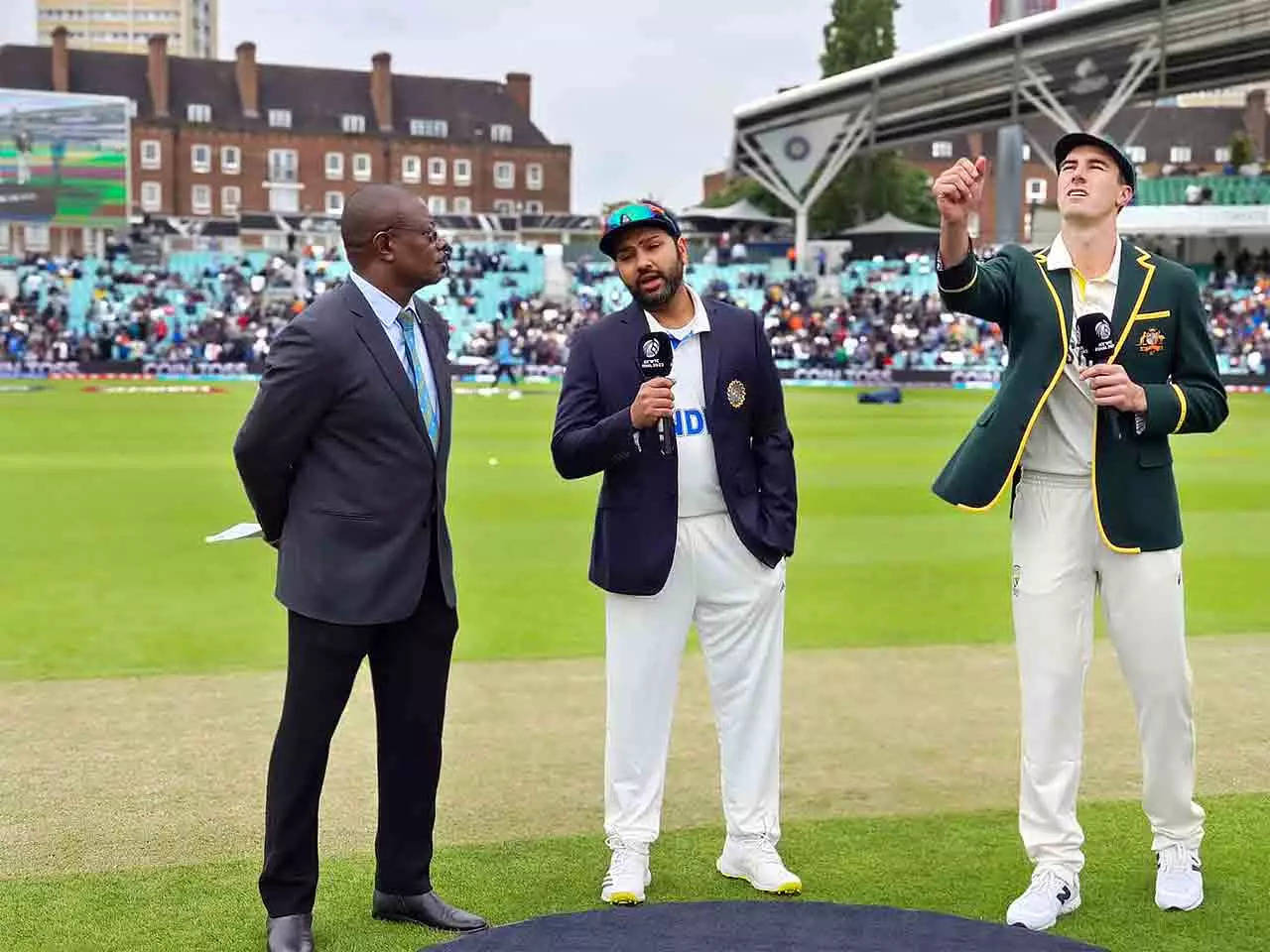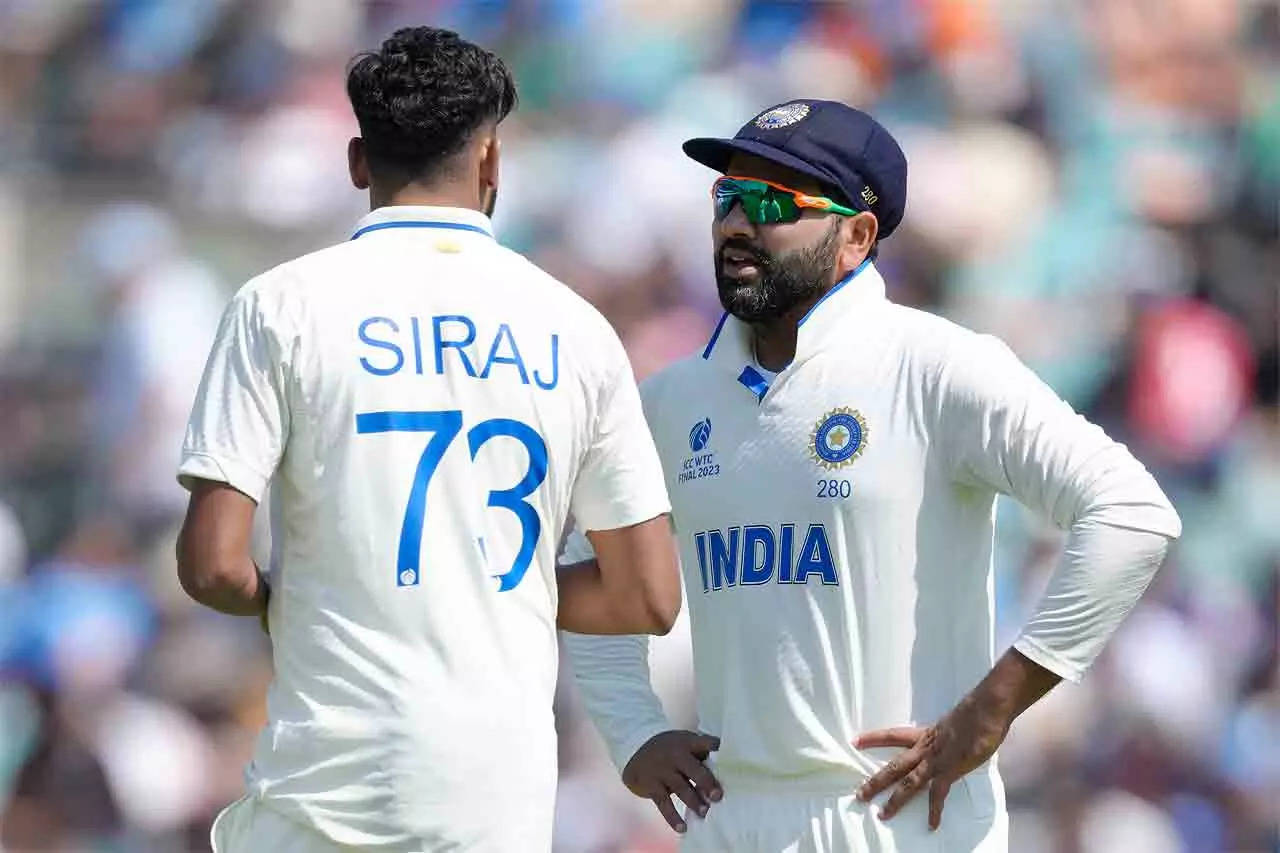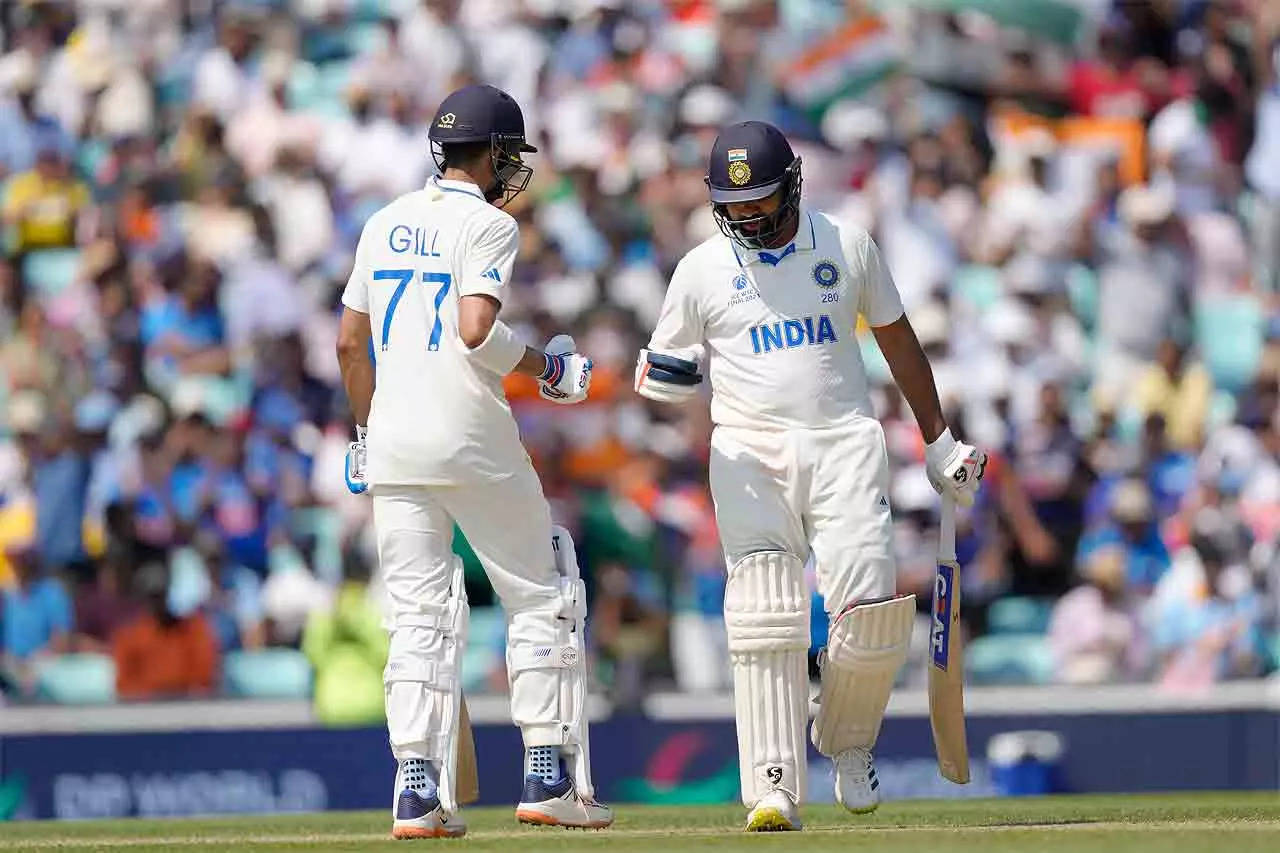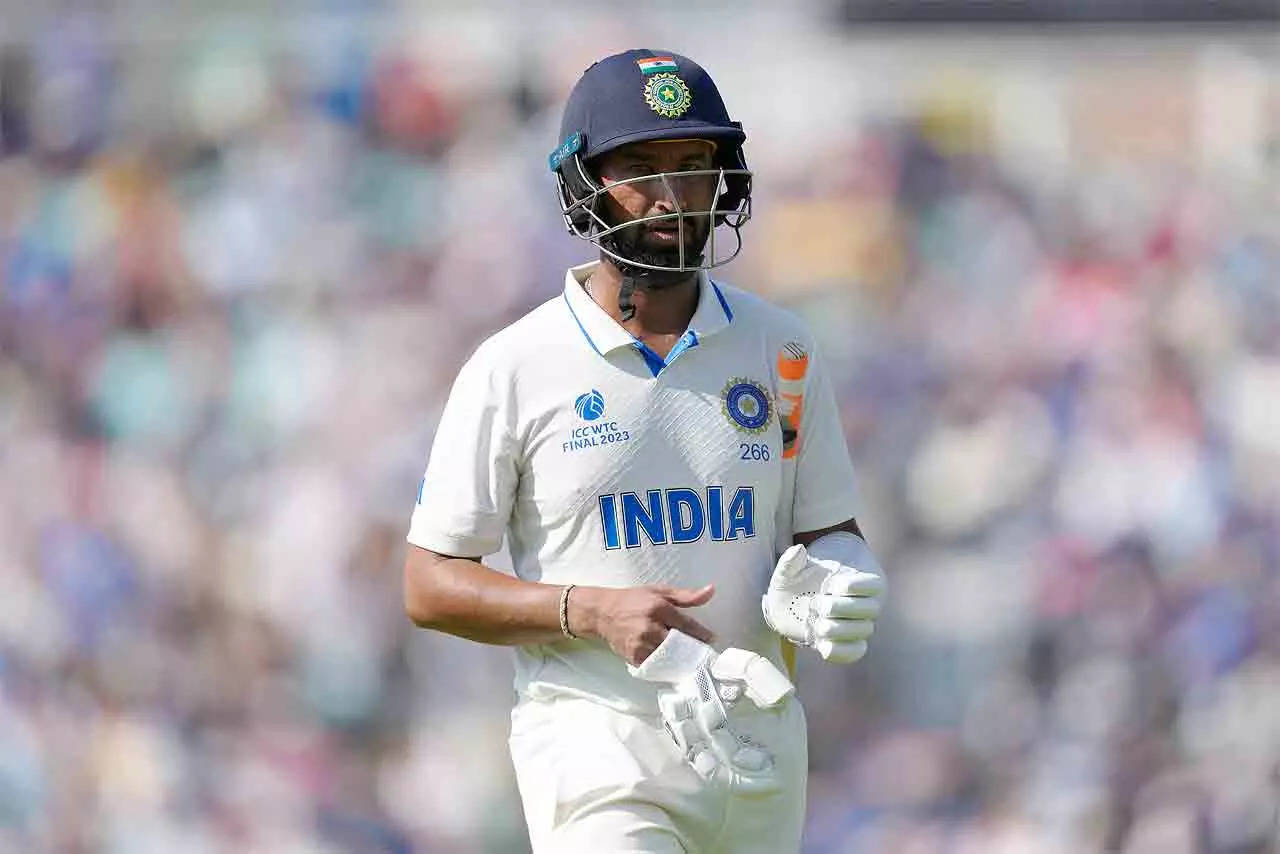Hindsight is almost always perfect vision. But when a team considered to be one of the superpowers of world cricket crumbles in yet another ICC final, it calls for assessment and analysis, no matter how harsh it might sound or read. Some things need to be said.
Since the 2013 ICC Champions Trophy title win, India have played eight semi-finals and finals combined in ICC tournaments and lost all eight. It's more than a pattern now. It's more than a red flag.
To say that Team India played poor cricket in the WTC Final would be an understatement. They were comprehensively outplayed by a better team in every department. And in many ways the writing was on the wall right from Day 1, where India won the toss but lost pretty much everything after that. Australia ended the opening day at 327/3 and continued to dominate proceedings. India were left to play catch up.

1/10:Australia claim maiden World Test Championship title
AFP
2/10:Maiden WTC title
<p>India's poor show in ICC events continued as Australia grabbed their maiden World Test Championship title with a crushing 209-run victory. <br /></p>Getty Images
3/10:Another flop show
<p>Chasing a record 444 on the final day, India resumed at 164/3 on Day 5 but were bowled out for 234 in the first session. <br /></p>Getty Images
4/10:The wait continues
<p>This is now India's second defeat in successive WTC finals after losing to New Zealand in 2021 in the inaugural edition.<br /></p>AFP
5/10:India all out in first session on Day 5
<p>Pacer Scott Boland sparked a dramatic collapse as India lost the remaining seven wickets for 70 runs inside 24 overs before lunch.<br /></p>AP
6/10:The Boland damage
<p>Scott Boland did the initial damage with 2 wickets in an over, including the prize scalp of Virat Kohli (49). <br /></p>AFP
7/10:The twin-blow
<p>In the seventh over of the day, Kohli edged fast bowler Boland to a great catch at second slip by Steve Smith. Boland then got Ravindra Jadeja (0) a couple of balls later.<br /></p>AFP
8/10:The tail wrap up
<p>The highest wicket-taker for Australia in the second innings, Nathan Lyon (4/41) then mopped up the tail in a jiffy. <br /></p>Getty Images
9/10:The Head, Smith tons
<p>Australia were in charge of the Final from Day 1 with both player-of-the-match Travis Head (163) and Steve Smith (121) firing tons in the total of 469.</p>Getty Images
10/10:The 173-run lead
<p>India were then bowled out for 296 in their first essay, giving away huge 173-run lead to Pat Cummins and co. <br /></p>AFPSo what really went Australia's way overall and where did Team India falter? Let's take a look at some of the big talking points:
India: Misreading the conditions and the pitch?
This needs to be posed as a question to be fair to the likes of Rohit Sharma, Rahul Dravid and other senior members of the team. India won the toss and opted to bowl first. On the face of it, it looked like the right call going by the overcast conditions in London on June 7. And when Usman Khwaja fell to Mohammed Siraj for a duck in the 4th over of the match, India's decision to put Australia in started to look like a good one. It looked like a great one when the Aussies were reduced to 76/3, with Warner and Labuschagne also back in the hut. But that's when two batters wielding contrasting batting styles showed us just how good the pitch was for batting. Steve Smith and Travis Head put on a 285 run stand to pretty much take the wind out of India's sails.
Dravid has gone on record to say - "We decided to bowl first in the Test match because the conditions were overcast and there was quite a lot of grass on the pitch.....We thought it would get easier to bat on later.....We thought it was a great decision when the Aussies were at 70/3 and then we leaked a lot of runs in the next two sessions.....It was not a 469 run wicket. We gave away a lot of runs --- bowling was disappointing."
But what if India had batted first and bucked the trend of what most teams tend to do in England?

(ANI Photo)
Australia: A good toss to lose
For Australia it seemed like a great toss to lose. Skipper Pat Cummins in fact said as much after the game. Once Smith and Head came together in the first innings, everything seemed to fall into place for them. To India's credit, they did manage to run through the Aussie tail rather quickly with Starc, Cummins, Lyon and Boland making a combined 24 runs. But Smith's 121, Head's 163 and Carey's 48 had already done the damage. Once Australia had 469 runs on the board, it was their match to lose. There's a reason why Travis Head was picked as the Man of the Match, apart from the fact that he registered the highest score in the game. The impact of his knock, coupled with that of Smith's was an early knockout punch.
India: The curious case of R Ashwin's exclusion
India opted to go in with a 4-1 bowling attack. 4 pacers and 1 spinner. And when the Number 1 ranked ICC Test bowler was kept on the bench it understandably raised quite a few eyebrows. Now, why did India not pick Ashwin? Let's look at the bowlers they did pick - Shami and Siraj pick themselves. The team also clearly wanted another pacer, along with Ravindra Jadeja, who could bat to give the batting more depth so they went with Shardul Thakur because you need at least 3 pacers. Thakur also had a good outing the last time he played at the Oval, scoring two half centuries and taking 3 wickets.
But they felt that one spinner would be enough, despite multiple experts saying later that the soil under the grass on the Oval pitch looked white, which indicated dryness. But they chose to go in with Umesh Yadav as the fourth pacer. There was no place for Ashwin. This despite the fact that the Aussies had as many as 5 left handers. Add to that the fact that Ashwin is a great bat as well. The man has 5 Test centuries and is widely regarded as one of the best off-spinners to have played the longest version of the sport.

1/10:WTC Final: The curious case of Ashwin's omission
IANS
2/10:Ravichandran Ashwin
<p>There was no place for off-spinner Ravichandran Ashwin in India's seam-heavy attack in the World Test Championship final against Australia at The Oval. </p>PTI
3/10:No. 1-ranked Test bowler
<p>But as Travis Head and Steve Smith put Australia on top on Day 1, India may rue the decision to leave out the No. 1-ranked Test bowler. </p>Reuters
4/10:Rohit Sharma
<p>India skipper Rohit Sharma tried to justify the call with well-grassed pitch which was a bit dry underneath and some grey skies at least to start with. </p>ANI
5/10:India's best bowler in WTC cycle
<p>Ashwin, India's most successful bowler in the 2021-23 WTC cycle, with 61 scalps from 13 Tests, missed his sixth Test in England in a row. </p>Getty Images
6/10:Team combination
<p>India's team combination had become as big a talking point as the pitch for the contest much before the game. </p>Getty Images
7/10:2 finals, 2 mistakes
<p>India had erred in the last WTC final in Southampton vs New Zealand in 2021 by picking two spinners in damp conditions. </p>AP
8/10:Ravindra Jadeja
<p>A 4-1 combination outside the subcontinent, with Ravindra Jadeja being preferred as the sole spinner because of his improved batting, has worked for India. </p>PTI
9/10:The wisdom
<p>But as Smith and Head repelled India, Rohit might have wondered about the wisdom of leaving out Ashwin, who could have been a threat against an Australia top five featuring three left-handers. </p>Getty Images
10/10:Australia's nemesis
<p>Ashwin may have made peace with the fact that potentially his last chance for another duel with an adversary that has defined his career is gone. </p>Getty ImagesIt almost looked like India didn't want to do what they did in the 2021 WTC Final vs New Zealand, where they played 3 pacers and 2 spinners and lost the game. But those conditions in Southampton were very different. There was also rain in the air. This time, on this pitch, in these conditions, Ashwin could have been a handful for the Aussies. And if he had played, India's tail would be a longer one too.
It must have been so frustrating for Ashwin to sit out. After all he was India's best bowler in the 2021-23 WTC cycle with 61 wickets in 13 Tests, with an average under 20 and best figures of 6/91. He played a huge role in India making the final cut and then didn't get to play the final.
Sachin Tendulkar tweeted to say that he 'failed to understand' Ashwin's exclusion. It was a sentiment that was echoed by cricket fans across the country.
Australia: No Hazlewood? No problem
On the flip side, the Aussies didn't have the services of one of their first choice pace picks - Josh Hazlewood. Not because he wasn't picked, but because he was not fully fit. But they didn't feel his absence at all. Starc, Cummins, Boland and Green made sure of that.
India: The bowling weak-links and where are the next-gen bowlers?
This 4 pacer strategy didn't work. Shardul and Umesh took 4 wickets between them in the match. Jasprit Bumrah's absence continues to hurt India of course, which meant that Shami and Siraj had to do much of the heavy lifting. 9 of the 18 Aussie wickets were taken by them
The bowling line-up that India fielded also begs the question - what is happening to the next gen, the next lot of bowlers on the supply chain? Does Umesh Yadav still belong at the highest level in the longest format? Should some promising youngsters like Arshdeep Singh not be given the chance to be back-up bowlers in the squad? If he is not Test match ready, is he being groomed for red ball cricket? Jayadev Unadkat, who hasn't been a regular starter in Tests for a long time now found a place in the squad.

(AP Photo)
Australia: The Boland factor and a hungry bowling attack
Scott Boland is 34 years old, but he has played only 8 Test matches so far. But the Aussies were confident that he has what it takes to be played in the final of the World Test Championship. Boland, who walked away with the Man of the Match award in the very first Test he played, which was an Ashes Test in December 2021, played a crucial role in the WTC Final, with 5 wickets in the game and giving away 105 runs. The wickets of Virat and Jadeja in the same over in India's second innings effectively rang Team India's death knell. Boland, who would not have made the playing XI cut if Hazlewood was fit, made sure he grabbed this opportunity with both hands.
Overall, the 5 Aussie bowlers combined beautifully. While the pacers ruled the roost in India's first innings, taking 9 of the 10 Aussie wickets that fell, Nathan Lyon took 4 in the second, which included wickets of India's top order, middle order and tailender batters.
India: Misfiring Top Order
India's top order didn't have much to write home about. Rohit, Shubman, Pujara and Virat combined scored a total of 193 runs in the match. Barring Ajinkya Rahane's 89 and Shardul's 51 in the first innings, there were no other half centuries. The India batters, especially the best in the line-up, needed to bat out of their skins in their first innings once Australia put up 469, but that didn't happen. While some fell to shots that have been criticised, others erred while leaving the ball.
Batters who got starts couldn't turn them into big scores.

(AP Photo)
Australia: Batters making the most of good starts
Australia's openers also didn't do much in this game. Barring Warner's in the first innings, they didn't get a good start. Khawaja had scores of 0 and 13. But what did work for them was batters like Smith, Head, Labuschagne and Carey making sure they scored big once they had settled in. While the likes of Head and Smith grabbed the headlines, someone like Carey needs a special mention. Coming In at number 7, his scores of 48 and 66 were crucial in putting India under a lot of pressure.
India: The real Chesteshwar Pujara didn't stand up
There was a lot of talk about how Pujara could potentially have a good match, considering he was the only Indian batter who had solid match practice in English conditions under his belt going into the WTC Final. It might have been in Division Two of the County Championship, but Pujara's sizzling form for Sussex was seen as a huge shot in the arm for India ahead of the WTC Final.

(AP Photo)
In the game though, the 35 year old fell for scores of 14 and 27. Both his dismissals were worrisome. In the first innings, the Test specialist left a ball that rattled his furniture and in the second he attempted to play a rather un-Pujara shot - an uppercut off a Cummins bouncer and was caught behind. The real Pujara never really showed up.
India: Scheduling, IPL fatigue and no real preparation
There is absolutely no doubt that the Indian players were tired. It was evident in the body language and once again raised questions about the scheduling of a match as important as this which was played to decide who the World champions of Test cricket would be.
No matter how much is written and spoken about it, the fact of the matter is that the top players will always play the IPL. And with the WTC Final scheduled for June (the 2021 final was also played in June in England), there is never any real gap between the IPL and this Test match. That coupled with the fact that the County Championship is on and also that the ECB doesn't need to arrange warm-up games, since this is an ICC event means that there is always the danger of the teams being undercooked. Allan Border had called this situation "fraught with danger" for the Aussies. As it turned out, it was Team India who found themselves at the wrong side of the result.
Overall IPL fatigue also is a big factor. Barring Pujara and KS Bharat, all other Indian players were playing IPL cricket, which is an exhausting tournament to say the least, with all the fast paced cricket and frequent travel.
Hazlewood's side injury flared up during the IPL and he had to return home, though it was his left Achilles injury which was the bigger concern.
Australia: Fresh legs
As far as the Aussie playing XI is concerned, only Warner and Cameron Green played in the IPL. Green in fact managed to switch gears from T20 mode to Tests rather well. Two members of their playing XI - Smith and Labuschagne also had County stints going into this match.
All-rounder Michael Nesser was picked as Hazlewood's replacement having taken into consideration the fact that he too was playing County cricket and was in good form.
In many ways, the Aussies chose to come in fresh for the WTC Final knowing full well just how heavy their workload will be, both physically and emotionally after this. The Ashes, which is the ultimate prize for any Aussie or English cricketer, begin in English conditions from June 16.



.png?w=600)




